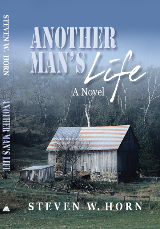Excerpt from ANOTHER MAN’S LIFE
 CHAPTER I
CHAPTER I
“He wondered if he ought to write a swan-song,
but laughed the thought away. There was no
time. He was impatient to be gone.”
Jack London
Martin Eden
5:15 a.m.
He would let her sleep for another hour. The day ahead would be hard on her. He would go to the barn. Eden wanted things to be simple for her.
He picked up the letter. The Great Seal of the United States embossed in gold gave the letterhead its intended authority. The blindfolded lady holding the balance in front of her intimidated him. He knew there would be no balance, no justice. Her scales would be tipped decidedly toward meaningless partisan, political objectives. The United States Department of Justice had convened a grand jury. The Senate hearings had given the president and attorney general little choice.
Outside, the August corn flagged gently in the pre-dawn Iowa breeze. Soon the fields would gain color as the sun crept above the wooded hills to the east. Already the peak of the barn and silvery dome of the silo were reflecting the first blush of day. When the sun reached the top of the barn door he would go.
Inside, the advancing light brought definition to the room. Every surface presented a memory of a life lived. Fifty-seven years of a man’s life represented by an odd collection of mementos: a pinecone from Scotland, an oak fern stand that was her grandmother’s, Buddy’s leather collar and tags. The room was comfortable. Photographs told the story, the epic that preceded him. Not the entire story, but the parts that should be preserved. Immigrants in ill-fitting clothes, babies in white christening gowns, graduations, hopeful couples—all represented by less than a second of their lives captured on film. Most were of Elizabeth’s side of the family. He had wanted it that way. It was her ancestral home and land. He was an outsider, a stranger passing by who had stopped to work for room and board. There were gaps in his story, dead spots that haunted him every day: holes that would soon be filled.
Jessica’s life visually unfolded from every available surface within the room. As their only child she did not have to compete for shelf space. The preteen years were the most photographed. By the age of fifteen her child-like cuteness had been replaced with the rebelliousness of a teenager. She’d quickly outgrown the defiant years and then she had been gone. She was thirty-four now. Her life with him seemed so long ago, a patchwork of recollections captured as still life. But he could animate each photo. He could feel his lungs burn as he ran beside her bicycle, training wheels removed. He felt the heat of an Iowa July and the stickiness of sweat on his arms as he officiated the watermelon eating contest that she won. He could hear the crunch of dry leaves and smell the crispness of fall as he led her to the pumpkin patch down by the river where she always selected the most misshapen pumpkin for her Jack-o’-lantern. Unbeknownst to anyone, he still planted that lower corner of the field to pumpkins every year and then plowed them under in November. He loved his daughter as if she were his own.
Remembrances, the past reinvented, he thought as he slowly scanned the room. His life seemed an odd collection of memories, a collage of colorless images without order, separated by the unmemorable routine of making a living. Some had dimension, vivid reminders of what he wanted to forget, the ones that took his breath away. They were the ones he could not share with Elizabeth. They were the ones that the rest of the world now wanted.
Looking at the letter again, he read, “Dear Mr. Cain: You are hereby summoned to appear—” He inhaled slowly, his chest rising. He held his breath. Through flared nostrils he exhaled with finality. He felt strangely relieved. It had been a long time. There would be no resolution, no absolution, only a millisecond of peace. He placed the letter on the end table next to the revolver.





